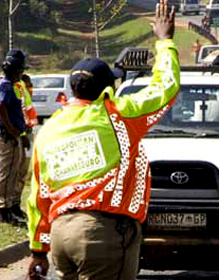|
Getting your Trinity Audio player ready...
|
 On Monday we release our hard-hitting report on corruption within the Johannesburg Metropolitan Police Department (JMPD), highlighting the unit’s weaknesses and the extent to which traffic police abuse their power on the roads.
On Monday we release our hard-hitting report on corruption within the Johannesburg Metropolitan Police Department (JMPD), highlighting the unit’s weaknesses and the extent to which traffic police abuse their power on the roads.
The report will form part of a weeks-long national anti-bribery campaign, No more tjo-tjo, which will also be launched today. Tjo-tjo is South African slang for bribery.
During the drive we will share vital information daily, initiate relevant debates on Facebook and Twitter, and ultimately turn up the heat so that tjo-tjo can be stamped out for good.
Generally, when we talk of irregular payment in exchange for a service, there’s “tipping”, a common way to thank someone for good service – and there’s “baksheesh”, requested in many Asian countries over and above taxi fare and other services.
But “bribery” has a different tone altogether, and is an increasingly common way for people in positions of authority to fill their personal coffers by scaring people or withholding services. Have you been a victim of this crime?
It’s highly likely you have … and you should, indeed, be outraged!
It’s hoped that Corruption Watch’s anti-bribery campaign and the research will help our citizens and civil society partners mobilise against corruption.
We’re going to shine a light on corruption – an obstacle to democracy and the rule of law. It intimidates people, undermines government and threatens development and our economy. It renders societies unfair – accountable political leadership cannot develop in an atmosphere of corruption.
In a survey conducted by Transparency International across six Southern African countries during 2010 and 2011, South Africans were the most likely to have had contact with the police – with 74% of the 1 000 urban South Africans surveyed indicating that they had had contact with the police in the last year.
Of these, 43% indicated that they had paid a bribe in some form. (Transparency International, 2011, 27-30).
It’s not just about bribes, though: corruption is the misuse of power or position for personal gain. Enrichment through any of the following activities can be interpreted as corrupt behaviour:
- Bribery, kickbacks and graft;
- Influence peddling and patronage;
- Favouritism, nepotism, ghost workers and illegitimate absenteeism in the workplace;
- Bid-rigging, price-fixing, arbitrage and profiteering;
- Cartels and collusion;
- Electoral fraud; and
- Tender and procurement irregularities.
The report released on Monday looks specifically at the JMPD, after Stats SA reported that more than 150 000 drivers in Johannesburg alone are asked to pay bribes annually.
Soliciting bribes appears to have become routine and, according to the report, it appears that over 50% of JMPD members may be involved in corruption.
Is our law for sale and, if so, at what cost to our national safety? With indications that some officers suggest – or demand – sexual favours in place of bribe money, personal safety is at risk.
Where officers accept money in exchange for not fining a reckless or unlicensed driver, national road safety is at risk.
What can be done and how does the JMPD go about doing it?
The report provides insights into the growing crime of bribery and offer concrete recommendations.
With small numbers of JMPD officials involved in corruption having been found guilty in disciplinary proceedings and dismissed, it’s an area of great concern – not only for the country’s leaders, but for every driver in Johannesburg and across the country.
The report – one of many that will shed light on both problems and solutions – is live on our website. Read it and follow this campaign before you take out your wallet – and let’s show the authorities our law and our democracy is NOT for sale.






